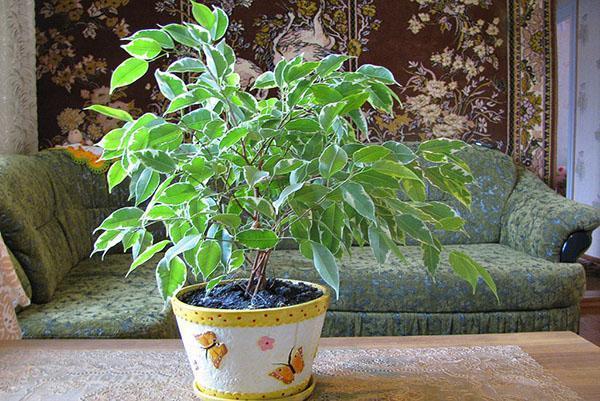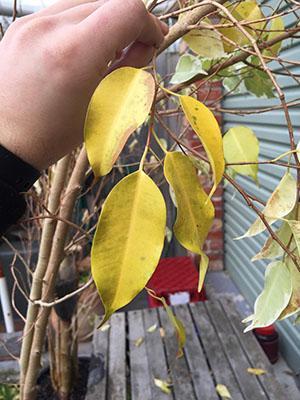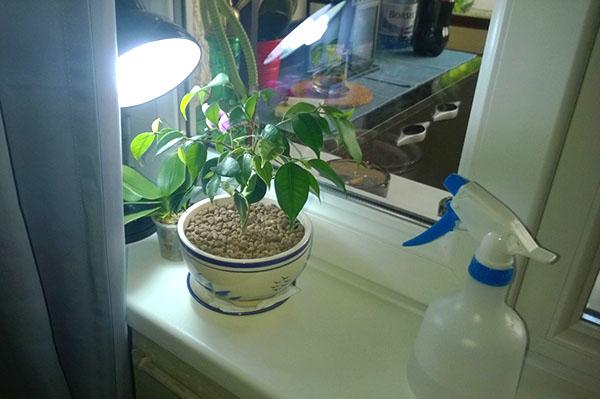Why isn't Benjamin's ficus growing? Looking for answers
 Of all the tribesmen on photo of ficus benjamin is considered one of the most capricious. And it is not surprising that the question: "Why does Benjamin's ficus not grow or lose foliage?" worries so many flower growers.
Of all the tribesmen on photo of ficus benjamin is considered one of the most capricious. And it is not surprising that the question: "Why does Benjamin's ficus not grow or lose foliage?" worries so many flower growers.
The main reasons for the poor health of the plant, causing growth retardation, yellowing and foliage, are errors in care and improperly selected conditions of maintenance.
Why does Benjamin's ficus shed its leaves, and what to do in such a situation to save the plant? The indigenous inhabitant of regions with a tropical and subtropical climate, Benjamin's ficus is accustomed to warmth and high humidity.
Ficus Benjamin leaves fall off due to lack and excess of light

Compared to other related species, the foliage of the Benjamin ficus is thinner and smaller. This means that the scorching rays of the sun can become possible causes of the painful state of the plant. Leading to evaporation of moisture, dehydration, leaves, and sometimes serious burns, excess sun negatively affects the strength and growth of the ficus.
Losing a supply of moisture, the leaf plates turn yellow ahead of time, and then crumble.
Exposure of shoots not only impairs the appearance of plants, but also weakens it. The less leaves on the crown, the slower the photosynthesis, and the ficus does not receive the energy necessary for growth.
Unfortunately, a similar picture can be observed if the ficus is deficient in the sun. Young shoots become thinner and longer. Fresh foliage becomes shallow, and the one on the lower tiers dries. As a result, leaves fall from Benjamin's ficus. The plant loses its decorative effect, its strength is depleted, and without proper care it can die.
That is why Benjamin's ficus does not grow if the place for it is not chosen correctly. Correcting the situation is easy enough. The main thing is to do it immediately, at the first signs of the green pet's illness.
 Subject to the rest of the rules of care, it is worth finding a place protected from the midday sun, where the flower will be illuminated from 10 to 14 hours a day, as the ficus comes to life. From autumn to the end of March in the middle lane, it is useful for a plant to arrange additional illumination... The same measure will help maintain the beauty of a tree standing far from the window.
Subject to the rest of the rules of care, it is worth finding a place protected from the midday sun, where the flower will be illuminated from 10 to 14 hours a day, as the ficus comes to life. From autumn to the end of March in the middle lane, it is useful for a plant to arrange additional illumination... The same measure will help maintain the beauty of a tree standing far from the window.
Having taken all measures to improve the situation, of course, it will not work to return the ficus to its former appearance. But the growth of full-fledged foliage will resume already on new, young stems.
 What if Benjamin's ficus sheds leaves despite proper lighting? No less often the plant suffers for other reasons. These include:
What if Benjamin's ficus sheds leaves despite proper lighting? No less often the plant suffers for other reasons. These include:
- moisture deficit or, conversely, regular waterlogging of the soil;
- drafts;
- excessive dry air in the room;
- non-compliance with the temperature regime of detention.
Even a sudden change of scenery can affect the well-being of a plant. For example, moving from store to house becomes a shock for ficus if the purchase is made during the cold season.
Why leaves fall from ficus: cold, heat and dry air
 Why doesn't Benjamin's ficus grow when it's cold in the apartment? This phenomenon can be explained by the thermophilicity of the guest from the tropics.But growers often complain that the formation of new shoots and foliage is noticeably inhibited at a temperature of 17-23 ° C, which is comfortable for the crop.
Why doesn't Benjamin's ficus grow when it's cold in the apartment? This phenomenon can be explained by the thermophilicity of the guest from the tropics.But growers often complain that the formation of new shoots and foliage is noticeably inhibited at a temperature of 17-23 ° C, which is comfortable for the crop.
Obviously in this case the plant:
- found itself in too dry air, which often happens when the heating is running;
- got into the cold air zone from an open transom, air conditioner or balcony.
Unable to tolerate being in too dry air, Benjamin's ficus sheds its leaves. What to do in this case? Move the pot to a place where the plant will be more comfortable, and if this is not possible, you can:
- use a household humidifier;
- irrigate the ficus crown every day from a distance of 20-30 cm;
- conduct warm showers and wipe the foliage with a damp cloth.
Loss of leaves due to watering errors
 For ficus Benjamin, it is equally dangerous to be in completely dry or oversaturated soil:
For ficus Benjamin, it is equally dangerous to be in completely dry or oversaturated soil:
- With excessive watering, especially when kept in cool air, the plant develops root rot. Ficus loses its ability to actively feed, its leaves dry out and begin to crumble.
- The dryness of the soil provokes the plant to save moisture, and the ficus gets rid of "extra consumers", that is, foliage. At the same time, the growth rate of young shoots is decreasing, causing a legitimate question for growers: "Why Benjamin's ficus is not growing?"
In order for the plant to always delight with bright greens and to grow well, the soil under the ficus should dry out a couple of centimeters between waterings. Frequency watering depends on the temperature and humidity in the room, the size of the plant and the properties of the substrate.
Ficus Benjamin sheds foliage due to lack of nutrition
Ficus Benjamin leaves fall off if the plant:
- is in a substrate poor in organic and mineral substances;
- have not been transplanted for a long time, and the roots do not have the opportunity to receive so much nutrition and moisture to meet all the needs of the overgrown crown.
An immediate measure will be feeding the decorative leafy culture with a liquid complex agent. And at the first opportunity, the ficus:
- pruning, forming a more compact crown and simultaneously removing bare and dead shoots;
- transplanted into a loose nutritious substrate, having previously selected a suitable, larger pot.
The longer Benjamin's ficus is in inappropriate conditions, the higher the risk of finding pests on it.
 Weakened plants are most often attacked by spider mites, thrips, scale insects... When a pet is taken out into the garden for the summer, aphids or miner fly larvae can settle on it.
Weakened plants are most often attacked by spider mites, thrips, scale insects... When a pet is taken out into the garden for the summer, aphids or miner fly larvae can settle on it.
So that uninvited guests do not cause the growth of Benjamin's ficus to stop and the foliage to fall, it is useful to regularly inspect the plant, and, if necessary, carry out treatment with systemic insecticides and acaricides.